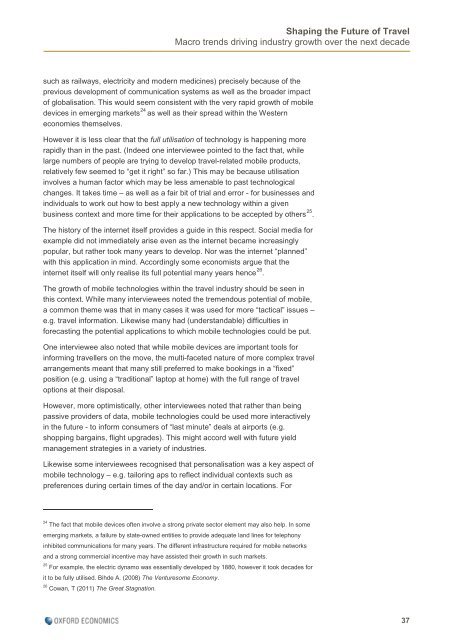Amadeus-Shaping-the-Future-of-Travel-MacroTrends-Report
Amadeus-Shaping-the-Future-of-Travel-MacroTrends-Report
Amadeus-Shaping-the-Future-of-Travel-MacroTrends-Report
Create successful ePaper yourself
Turn your PDF publications into a flip-book with our unique Google optimized e-Paper software.
<strong>Shaping</strong> <strong>the</strong> <strong>Future</strong> <strong>of</strong> <strong>Travel</strong><br />
Macro trends driving industry growth over <strong>the</strong> next decade<br />
such as railways, electricity and modern medicines) precisely because <strong>of</strong> <strong>the</strong><br />
previous development <strong>of</strong> communication systems as well as <strong>the</strong> broader impact<br />
<strong>of</strong> globalisation. This would seem consistent with <strong>the</strong> very rapid growth <strong>of</strong> mobile<br />
devices in emerging markets 24 as well as <strong>the</strong>ir spread within <strong>the</strong> Western<br />
economies <strong>the</strong>mselves.<br />
However it is less clear that <strong>the</strong> full utilisation <strong>of</strong> technology is happening more<br />
rapidly than in <strong>the</strong> past. (Indeed one interviewee pointed to <strong>the</strong> fact that, while<br />
large numbers <strong>of</strong> people are trying to develop travel-related mobile products,<br />
relatively few seemed to “get it right” so far.) This may be because utilisation<br />
involves a human factor which may be less amenable to past technological<br />
changes. It takes time – as well as a fair bit <strong>of</strong> trial and error - for businesses and<br />
individuals to work out how to best apply a new technology within a given<br />
business context and more time for <strong>the</strong>ir applications to be accepted by o<strong>the</strong>rs 25 .<br />
The history <strong>of</strong> <strong>the</strong> internet itself provides a guide in this respect. Social media for<br />
example did not immediately arise even as <strong>the</strong> internet became increasingly<br />
popular, but ra<strong>the</strong>r took many years to develop. Nor was <strong>the</strong> internet “planned”<br />
with this application in mind. Accordingly some economists argue that <strong>the</strong><br />
internet itself will only realise its full potential many years hence 26 .<br />
The growth <strong>of</strong> mobile technologies within <strong>the</strong> travel industry should be seen in<br />
this context. While many interviewees noted <strong>the</strong> tremendous potential <strong>of</strong> mobile,<br />
a common <strong>the</strong>me was that in many cases it was used for more “tactical” issues –<br />
e.g. travel information. Likewise many had (understandable) difficulties in<br />
forecasting <strong>the</strong> potential applications to which mobile technologies could be put.<br />
One interviewee also noted that while mobile devices are important tools for<br />
informing travellers on <strong>the</strong> move, <strong>the</strong> multi-faceted nature <strong>of</strong> more complex travel<br />
arrangements meant that many still preferred to make bookings in a “fixed”<br />
position (e.g. using a “traditional” laptop at home) with <strong>the</strong> full range <strong>of</strong> travel<br />
options at <strong>the</strong>ir disposal.<br />
However, more optimistically, o<strong>the</strong>r interviewees noted that ra<strong>the</strong>r than being<br />
passive providers <strong>of</strong> data, mobile technologies could be used more interactively<br />
in <strong>the</strong> future - to inform consumers <strong>of</strong> “last minute” deals at airports (e.g.<br />
shopping bargains, flight upgrades). This might accord well with future yield<br />
management strategies in a variety <strong>of</strong> industries.<br />
Likewise some interviewees recognised that personalisation was a key aspect <strong>of</strong><br />
mobile technology – e.g. tailoring aps to reflect individual contexts such as<br />
preferences during certain times <strong>of</strong> <strong>the</strong> day and/or in certain locations. For<br />
24 The fact that mobile devices <strong>of</strong>ten involve a strong private sector element may also help. In some<br />
emerging markets, a failure by state-owned entities to provide adequate land lines for telephony<br />
inhibited communications for many years. The different infrastructure required for mobile networks<br />
and a strong commercial incentive may have assisted <strong>the</strong>ir growth in such markets.<br />
25 For example, <strong>the</strong> electric dynamo was essentially developed by 1880, however it took decades for<br />
it to be fully utilised. Bihde A. (2008) The Venturesome Economy.<br />
26 Cowan, T (2011) The Great Stagnation.<br />
37


